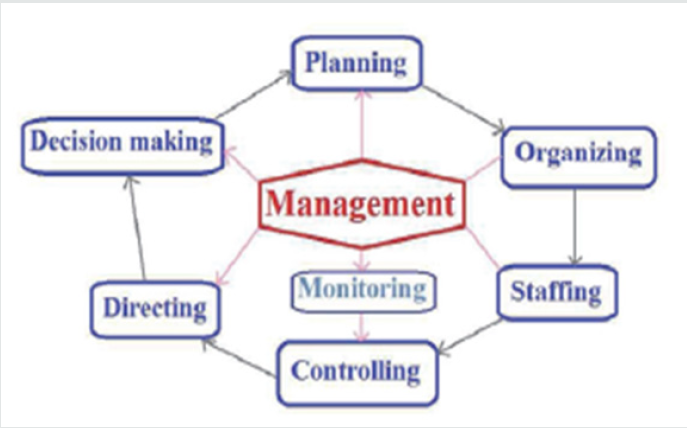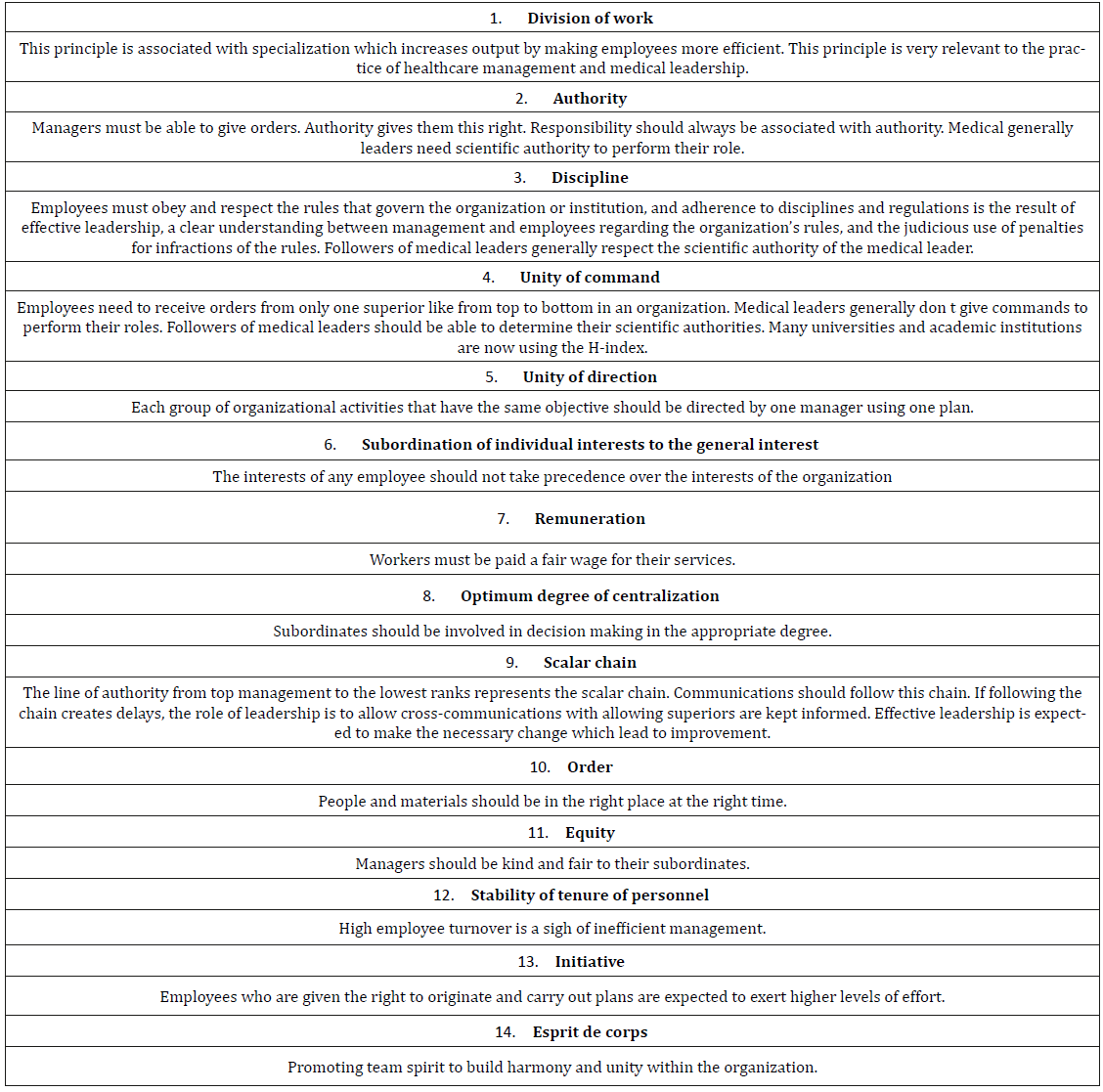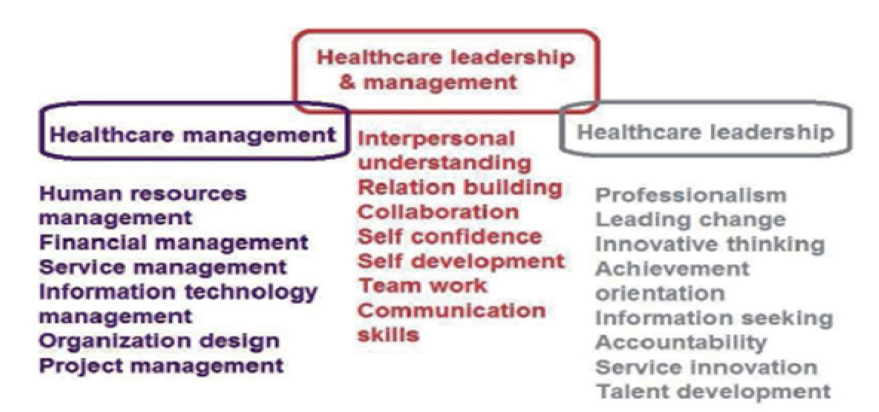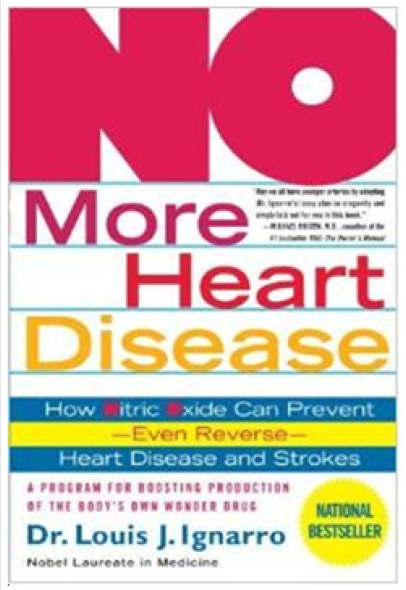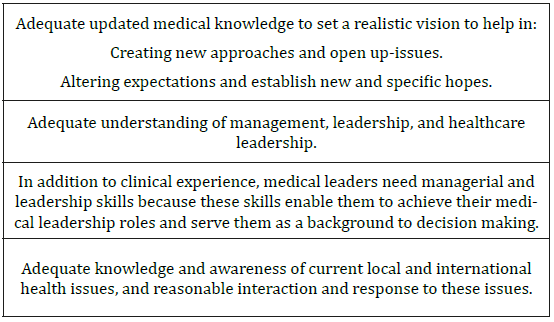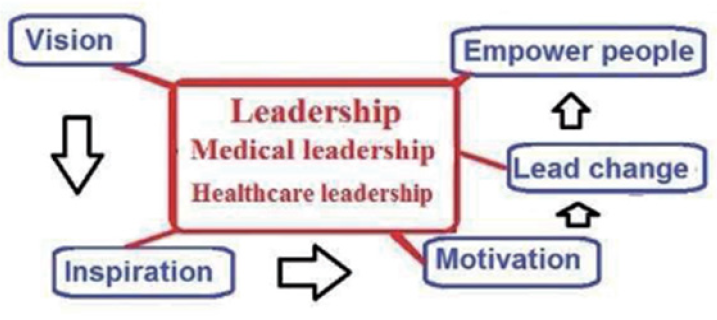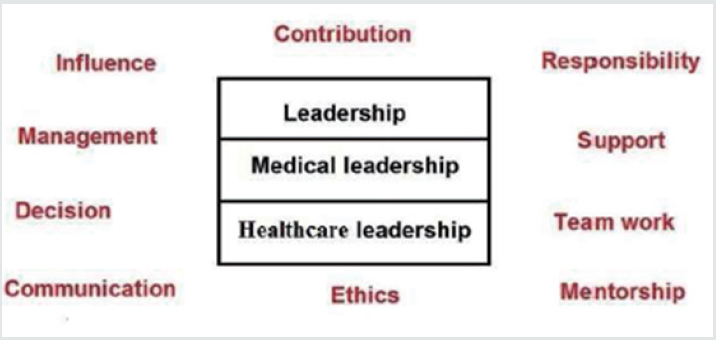
Lupine Publishers Group
Lupine Publishers
Menu
ISSN: 2641-1725
Review Article(ISSN: 2641-1725) 
Leadership in Medicine and Healthcare: An Overview of the Emerging Concepts and Principles Volume 4 - Issue 1
Aamir Jalal Al Mosawi1,2*
- 1Advisor in Pediatrics and Pediatric Psychiatry, Children Teaching Hospital of Baghdad Medical City, Iraq
- 2Advisor doctor and expert trainer, The National Center of Training and Development, Iraqi Ministry of Health, Iraq
Received: November 17, 2019; Published: December 02, 2019
*Corresponding author: Aamir Jalal Al Mosawi, Advisor in Pediatrics and Pediatric Psychiatry, Children Teaching Hospital of Baghdad Medical City, Iraqi Ministry of Health, Iraq
DOI: 10.32474/LOJMS.2019.04.000179
Abstract
It has been increasingly recognized that effective leadership is essential for healthcare organizations and healthcare systems to provide high quality care and financial success. Therefore, healthcare leaders and medical leaders need to have an adequate understanding of the principles and concepts of management leadership, healthcare management, nursing leadership, medical leadership. The aim of this paper is to describe the emerging concepts and principles of leadership in medicine and healthcare.
Keywords: Leadership; medicine; healthcare
Introduction
It has been increasingly recognized that effective leadership is
essential for healthcare organizations and healthcare systems to
provide high quality care and financial success. Therefore, healthcare
leaders and medical leaders need to have an adequate understanding
of the principles and concepts of management leadership,
healthcare management, nursing leadership, medical leadership.
The concepts of management and leadership are the older and
original concepts. The specific use of the concepts of management
and leadership in the medical and nursing fields and health care
resulted in the emergence of the concepts of healthcare manage
ment, healthcare leadership, medical leadership, nursing leadership.
The scientific methodological application of the concepts of
management and leadership in the medical fields and health care
resulted in the emergence of the disciplines of healthcare management,
healthcare leadership, medical leadership, nursing leadership.
Medical and Healthcare leaders need to have an adequate
understanding of the basics of medical leadership, healthcare leadership,
nursing leadership and the roles and qualities of medical,
and healthcare leaders and nursing leaders as they have to cooperate
with them and support them [1-3].
The absolute need for medical knowledge to practice medical
leadership is the thing that makes medical leadership characteristi
cally distinctive and distinguishes it from other disciplines related
to health care leadership [2,3]. Figure 1 shows the overlap between
various types of leaderships in medical and healthcare setting and
emphasizes the need for medical knowledge in the field of medical
leadership [2,3]. Healthcare managers and leaders generally supervise
the nursing services and need to be familiar with its principles.
Nursing leadership can be defined as process of interpersonal influence
in which the patient assisted in the realization of goal towards
improved well-being. The main practices of nursing leadership
are nursing team leadership, patient teaching and education. The
main components of nursing team leadership is assigning staff and
motivating team, while the main function of nursing team leader
is to determine the number of staff for each task and to organize
their work so that they are able to give adequate care to all patients.
Patient teaching and education from the nursing leadership point
of view is generally defined as a dynamic interaction between the
nurse and the patient [2,3].
There is some overlap between leadership and management,
but leadership is not management [2-4]. The main aims of management
is the achievement of order and consistency (Stability). It
is concerned with administration and maintenance, planning and
budgeting. organizing and staffing, controlling and solving daily
problems [3,4]. Figure 2 shows the main management processes. In most instances, highly qualified decent managers doing their jobs
perfectly and with precision will not lead to remarkable development
and improvement in the organization and that is why leadership
is needed in any organization [2,3], because management is
all about making or producing acceptable results with in a known
condition, and not much concerned about producing remarkable
management [4]. Leadership gives guidance and is associated with
change to the better and innovations because leaders provide the
necessary guidance, establish vision and strategies. In fact, leadership
is all about guidance changing the order of things, while management
is responsible for maintaining routines and solving daily
problems. The lack of necessary guidance means the lack of leadership,
and that is why all organizations have to able to identify their
leaders, the people capable of giving guidance [2-4].
Figure 1: The is overlap between various types of leaderships in medical and healthcare setting and the absolute need for medical knowledge to practice medical leadership is the thing that makes medical leadership characteristically distinctive and distinguishes it from other disciplines related to health care leadership.
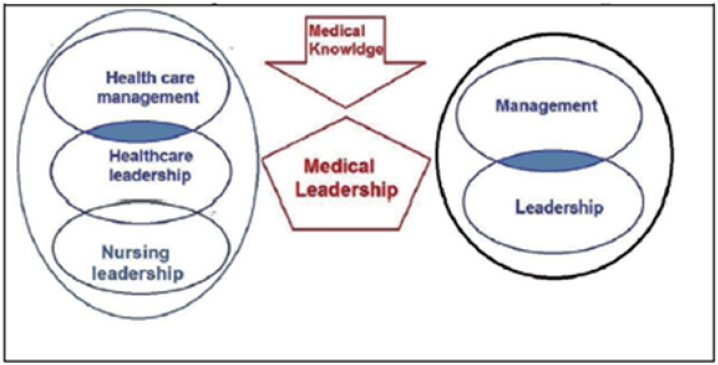
However, it is important to realize that leadership cannot work
in the absence of management as management provides the optimal
and organized environment and the background for giving
guidance by leaders which contribute to change to the better and
development through the introduction of innovations [1-4].
Therefore, both management and leadership are necessary in
every organization. Medical and health care leaders need to apply
the relevant concepts and processes of leadership to the specific
field of medicine and health care, while health care managers need
to apply the relevant principles and processes of management to
the specific field of health care [2-4].
It has been increasingly recognized that one of the important
factors that lead to failure of organizations partially or completely
is the lack of understanding of the differences between manage ment and leadership which leads to failure to identify leaders and
support them [1-3].
There are many acceptable definitions of management. Management
can be defined as the act of getting people or employees
together to realize desired goals and objectives. Management can
also be defined as the organization and coordination of the activities
of an organization in accordance with certain policies in the
achievement of clearly defined objectives. Management is the art of
getting work done through people or employees with satisfaction
for the stakeholders, employers, employees and public by guiding,
directing, coordinating and controlling all efforts towards the fulfillment
of the goals [2,4].
Goal achievement is the key to successful management. Goals
are fulfilled through the use of the available resources such as human
and financial resources and proper planning. The main functions
of management include making predictions and planning, organizing,
commanding, coordinating, and control through receiving
feedback about a process in order to make necessary adjustments
[4].
Table 1 summarizes the fourteen principles of management
and their relevance to medical leadership [2-4].
Healthcare management essentially describes the general management
and administration of hospitals and public healthcare systems
mostly by adopting the relevant from general management.
Healthcare management is also referred to as medical and health
services management, healthcare systems management, health systems
management, health administration [2,3].
Healthcare leadership is concerned with healthcare services
and their quality and safety. As patients’ satisfaction is one of the
important factors that determine the quality of services, healthcare
leadership practices emphasize the importance of the patients’
opinion, experience, concerns, needs and feedback (positive and
negative). Healthcare leadership encourages innovation of services
within safe boundaries. Healthcare leadership emphasizes transparency
when it comes to medical errors and serious incidents
and considers medical mistakes as opportunities for learning and
improving performance. Healthcare leadership also acts effectively
to deal with poor performance and address unacceptable practices
displayed by staff or patients. Healthcare leadership encourages
continuous development of the knowledge, skills and abilities
of staff in order to improve quality of patient care, safety, and the
patient experience, and also encourages, motivates and rewards innovation
that improve the services [2,3]. Table 2 summarizes the
practices of healthcare management and leadership, while Figure
3 shows the areas of overlap between healthcare management and
leadership as two disciplines.
The past five decades witnessed an explosion in medical knowledge, dramatic innovation in therapies and surgical procedures, and management of conditions that previously were fatal, with ever more superior clinical capabilities on the horizon. Despite that, health care even in developed countries were thought to be falling short on basic dimensions of quality, outcomes, costs, and equity, and that was attributed to the fact that the available medical knowledge is too rarely applied to improve the health care experience, and the information generated by the care experience is too rarely used to improve the knowledge available. The traditional healthcare management systems which are supposed to be responsible for the transfer of new medical knowledge into healthcare organizations were considered to be failing not only the developing countries [2,3,5-8].
Therefore, a notion has emerged suggesting that highly qualified, experienced managers who doing their jobs correctly are not expected to be capable of introducing new knowledge, advances, and innovations into the practice of healthcare organizations.
Figure 4: Warren Bennis, a leadership expert was probably the first to develop the idea that failing organizations are over managed and under-led.
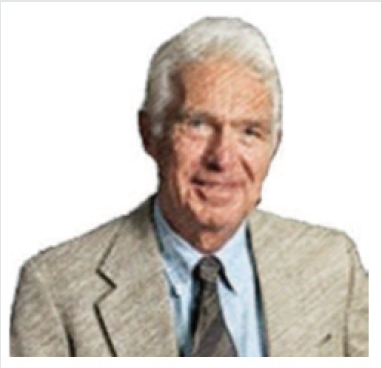
A second notion has emerged suggesting that in many areas of
the world, the healthcare system and many healthcare institutions
are over-managed or at least well managed, but under-led. Warren
Bennis (Figure 4), a leadership expert was probably the first to develop
the idea that failing organizations are over managed and under-
led, and that organizations decline because people forget what
is important [2,3].
Ultimately, the perception of the lack of medical leadership led
to the emergence of the concept of medical leadership, and emphasis
has been made that highly qualified managers can’t lead healthcare
systems. This concept has been supported by the fact that
even in areas where individual physicians, and other healthcare
professionals involved in patient care worked diligently to provide
high-quality, compassionate care to their patients, they couldn’t
reach the expected and desired improvement in the provision of
healthcare.
Emphasis has been increasingly made that in many healthcare
systems, the problem was that the management system didn’t adequately
support healthcare professionals to introduce the advances
and the innovations they know or learn into their practice and
work. The management system was not efficient in adjusting to
new discoveries, disseminating data in real time, organizing and
coordinating the sizable amount of research and recommendations,
and providing incentives for choosing the smartest approaches to
health, not just the newest, and often most expensive tool. Therefore,
an essential concept has emerged suggesting that the lack of
medical leadership prevents clinicians from providing the best care
to their patients and limits their ability to continuously learn and
improve [2,3].
Figure 5: Dr Luis Ignaro seems to represent a classical example of true medical leaders that are capable to make the difference in healthcare.
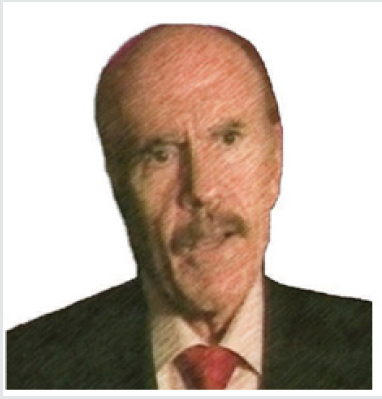
Dr Luis Ignaro (Figure-5) seems to represent a classical example
of true medical leaders that are capable to make the difference
in healthcare. He shared a Nobel prize in medicine with two
of his colleagues for his research on the role of nitric oxide in the
reduction of cardiac diseases. Dr Luis used the new information he
discovered with his colleagues in the prevention of cardiovascular
heart disease. His work represented a breakthrough in heart disease
prevention. The successful leadership of Dr Luis Ignaro illustrated
the fact that medical leaders can’t lead without knowledge,
and the absolute need for medical knowledge is what distinguishes
medical leadership from other related disciplines [2,3,9].
It is important to realize that medical leadership is not all about
making scientific discoveries, but it is all about introducing discoveries
and innovations into healthcare and practice. The scientific
discoveries of Luis Ignaro made him a scientific academic leader,
but his ability and work to transfer new knowledge and discoveries
into healthcare, into his practice made him medical leader. It seems
that medical leaders need to explore first what to innovate, not how
to innovate. Cardiovascular diseases were the cause of 17.5 million
deaths in 2012 that is 3 in every 10 deaths, and the innovations of
Luis Ignaro is highly relevant to this fact.
Leadership gives guidance and is associated with change to
the better and innovations because leaders provide the necessary
guidance, establish vision and strategies, Luis Ignaro was highly
successful in providing useful guidance and vision in his published
book (Figure 6) which carried the name of his vision “No more
heart disease”. Luis Ignaro inspired me myself to publish a book
which can help in introducing many innovations in medical practices
based on the early work of Luis Ignaro [2,3,9].
Medical leadership can be learned by studying role models in
medicine, the good like Dr Ignaro and bad. Medical leadership can
also be learned through self-experience, the experience of a mentor
or the experience of someone we respect.
The influence of medical leadership is achieved largely through
giving guidance, the contribution to change and innovations, establishing
direction, setting vision and strategies. Medical leadership
is all about introducing discoveries, advancement and innovations
into healthcare and practice, and to do that, medical leaders need
to have certain attributes, summarized in (Table 3). Figure 7 shows
how adequate updated medical knowledge, one of the key attributes
of successful medical leaders help in the introduction of innovation
[2,3].
Figure 7: The contribution of adequate updated medical knowledge, one of the key attributes of successful medical leaders to the introduction of innovation.

The concepts of medical leadership and healthcare leadership are not exactly the same concepts of leadership in general. Leadership in general is a process of social influence in which the leader can recruit the aid and support of others in the accomplishment of a common task. Both medical leadership and healthcare leadership adopt many of the concepts of leadership in general, but not all the ideas and thoughts of leadership in general are relevant to the practice of medical and healthcare leadership [1-3]. Figure 8 summarizes the common components of medical and healthcare leadership and leadership in general, while Figure 9 summarizes the common qualities of medical and healthcare leadership and leadership in general.
References
- Al Mosawi AJ (2012) Medical leadership. LAP Lambert Academic Publishing, Germany.
- Al Mosawi AJ (2016) Medical and Healthcare leadership: A training course. LAP Lambert Academic Publishing, Germany.
- Al Mosawi AJ (2017) Leadership in Medicine and Healthcare: An accredited training course. LAP Lambert Academic Publishing, Germany.
- Al Mosawi AJ (2012) Management principles for doctors. LAP Lambert Academic Publishing, Germany.
- Al Mosawi AJ (2014) Healthcare system in Iraq. LAP Lambert Academic Publishing, Germany.
- Al Mosawi AJ (2006) The Practice of evidence-based medicine. The N Iraqi J Med 2(1): 8-10.
- Al Mosawi AJ (2005) Our Experience with continuing medical education (CME) programme. The CME center, University Hospital in AL-Kadhimiyia. The N Iraqi J Med 1(3): 8-9.
- Al Mosawi AJ (2011) Medical knowledge management and managing knowledge within the health setting 7(2): 78-83.
- Al Mosawi AJ (2012) L-arginine research progress. LAP Lambert Academic Publishing, Germany.

Top Editors
-

Mark E Smith
Bio chemistry
University of Texas Medical Branch, USA -

Lawrence A Presley
Department of Criminal Justice
Liberty University, USA -

Thomas W Miller
Department of Psychiatry
University of Kentucky, USA -

Gjumrakch Aliev
Department of Medicine
Gally International Biomedical Research & Consulting LLC, USA -

Christopher Bryant
Department of Urbanisation and Agricultural
Montreal university, USA -

Robert William Frare
Oral & Maxillofacial Pathology
New York University, USA -

Rudolph Modesto Navari
Gastroenterology and Hepatology
University of Alabama, UK -

Andrew Hague
Department of Medicine
Universities of Bradford, UK -

George Gregory Buttigieg
Maltese College of Obstetrics and Gynaecology, Europe -

Chen-Hsiung Yeh
Oncology
Circulogene Theranostics, England -
.png)
Emilio Bucio-Carrillo
Radiation Chemistry
National University of Mexico, USA -
.jpg)
Casey J Grenier
Analytical Chemistry
Wentworth Institute of Technology, USA -
Hany Atalah
Minimally Invasive Surgery
Mercer University school of Medicine, USA -

Abu-Hussein Muhamad
Pediatric Dentistry
University of Athens , Greece

The annual scholar awards from Lupine Publishers honor a selected number Read More...




